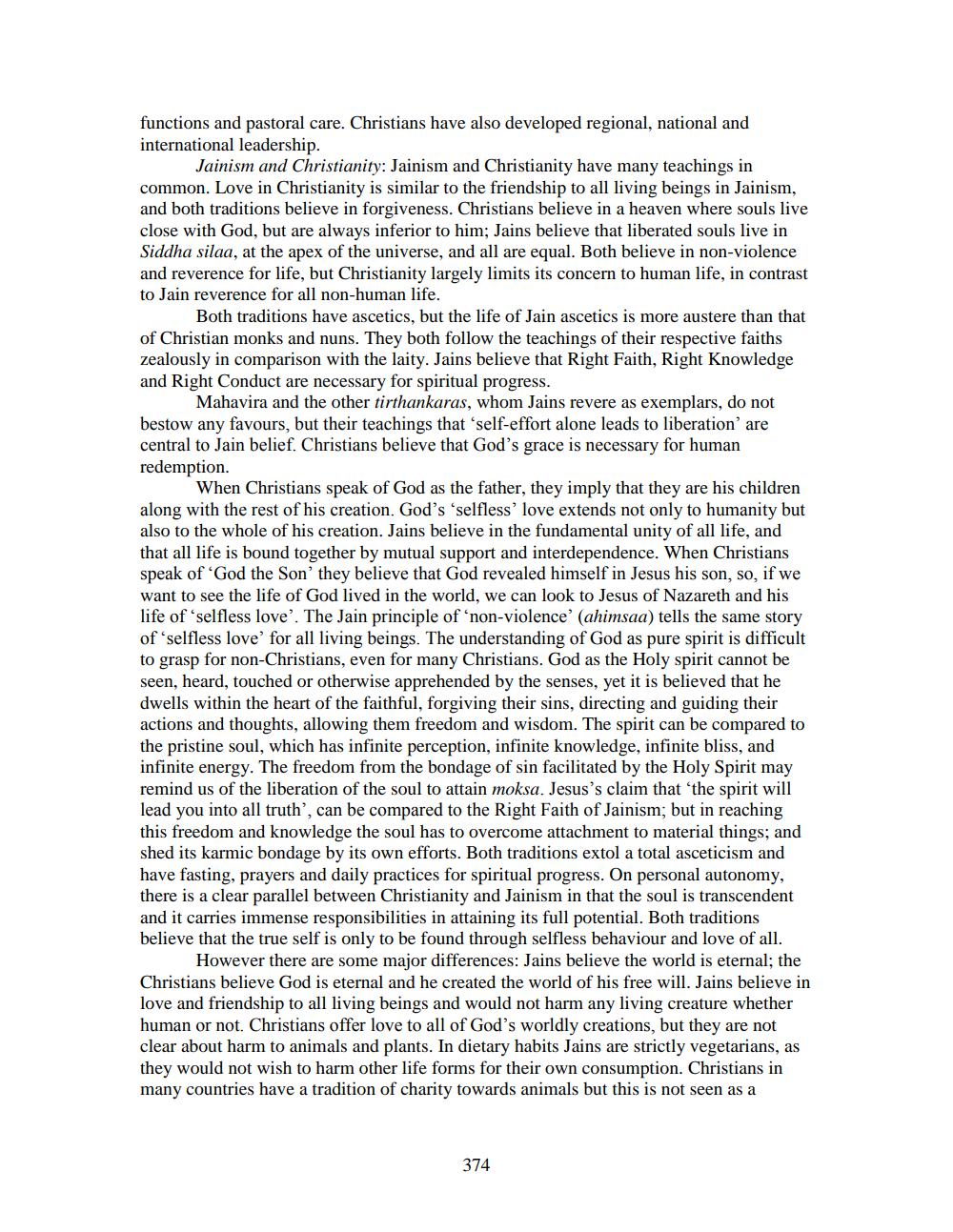________________
functions and pastoral care. Christians have also developed regional, national and international leadership.
Jainism and Christianity: Jainism and Christianity have many teachings in common. Love in Christianity is similar to the friendship to all living beings in Jainism, and both traditions believe in forgiveness. Christians believe in a heaven where souls live close with God, but are always inferior to him; Jains believe that liberated souls live in Siddha silaa, at the apex of the universe, and all are equal. Both believe in non-violence and reverence for life, but Christianity largely limits its concern to human life, in contrast to Jain reverence for all non-human life.
Both traditions have ascetics, but the life of Jain ascetics is more austere than that of Christian monks and nuns. They both follow the teachings of their respective faiths zealously in comparison with the laity. Jains believe that Right Faith, Right Knowledge and Right Conduct are necessary for spiritual progress.
Mahavira and the other tirthankaras, whom Jains revere as exemplars, do not bestow any favours, but their teachings that 'self-effort alone leads to liberation are central to Jain belief. Christians believe that God's grace is necessary for human redemption.
When Christians speak of God as the father, they imply that they are his children along with the rest of his creation. God's 'selfless' love extends not only to humanity but also to the whole of his creation. Jains believe in the fundamental unity of all life, and that all life is bound together by mutual support and interdependence. When Christians speak of 'God the Son' they believe that God revealed himself in Jesus his son, so, if we want to see the life of God lived in the world, we can look to Jesus of Nazareth and his life of selfless love'. The Jain principle of ‘non-violence' (ahimsaa) tells the same story of selfless love for all living beings. The understanding of God as pure spirit is difficult to grasp for non-Christians, even for many Christians. God as the Holy Spirit cannot be seen, heard, touched or otherwise apprehended by the senses, yet it is believed that he dwells within the heart of the faithful, forgiving their sins, directing and guiding their actions and thoughts, allowing them freedom and wisdom. The spirit can be compared to the pristine soul, which has infinite perception, infinite knowledge, infinite bliss, and infinite energy. The freedom from the bondage of sin facilitated by the Holy Spirit may remind us of the liberation of the soul to attain moksa. Jesus's claim that 'the spirit will lead you into all truth', can be compared to the Right Faith of Jainism; but in reaching this freedom and knowledge the soul has to overcome attachment to material things, and shed its karmic bondage by its own efforts. Both traditions extol a total asceticism and have fasting, prayers and daily practices for spiritual progress. On personal autonomy, there is a clear parallel between Christianity and Jainism in that the soul is transcendent and it carries immense responsibilities in attaining its full potential. Both traditions believe that the true self is only to be found through selfless behaviour and love of all.
However there are some major differences: Jains believe the world is eternal; the Christians believe God is eternal and he created the world of his free will. Jains believe in love and friendship to all living beings and would not harm any living creature whether human or not. Christians offer love to all of God's worldly creations, but they are not clear about harm to animals and plants. In dietary habits Jains are strictly vegetarians, as they would not wish to harm other life forms for their own consumption. Christians in many countries have a tradition of charity towards animals but this is not seen as a
374




